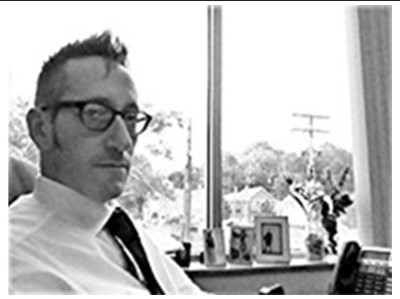Editor’s Note: We welcome back Radio Free New Hampshire. Michael Davidow took a few months off from his column to finish his latest novel “Interdiction about a veteran cop in a small New Hampshire town who shoots and kills a college student in a traffic stop gone awry. The ensuing investigation presents a tale of drug dealing, gunplay, and justifiable homicide. The lawyers are in control. The police are waiting and watching. The sole civilian witness to this killing is under indictment herself and silent regarding what she saw. The state’s most powerful politicians line up behind their officer. Only one thing stands between him and exoneration: another cop from another small town who begins to question what happened that night. His past has called him to his own separate truth.” It is awesome and available on Amazon.
By MICHAEL DAVIDOW, Radio Free New Hampshire
The optimism underpinning Donald Trump’s presidency is both epic and epochal. Like it or not, his willingness to re-imagine our nation’s infrastructure is not only astonishing; it also stems from a liberalism so profound that its depth seems like a mirage. You have to revisit the 1960’s to find a political ethos so inundated with the aura of individualism. But that fact strikes the tonic note of Trump’s reach. He takes his cue from the amateurs and the radicals of that era, not from the professionals. It’s the sixties as seen through a cartoon lens; it’s the sixties as absorbed by a spoiled rich kid who was not really paying attention.
A passing word, then, in favor of optimism; in favor of rethinking stale ideas. Republicans since Reagan have tried to eradicate the Department of Education, which was born of political expediency to begin with. While we clearly need to do better with our children, that sluggish bureaucracy has never been the answer.
Other fresh approaches that merit approbation: we’ve lavished funds on foreign governments for decades; by doing so we have mangled their local economies and warped their local power structures; and nobody has prospered yet. Trump’s handling of trade has been shambolic; yet China’s chauvinism has long required a surer grip on our own national interests. Trump’s trashing of our alliances is disgraceful and self-defeating; yet again, Europe’s defense situation has long merited a firmer hand. Our country’s leading universities have proven themselves both spineless and shameless, when not actively perverse; they too have long begged for more oversight and less spoiling. The list goes on.
There are myriad problems in our country that have acquired constituencies and been made to fester, and credit goes to those who are addressing them. “We are called to be the architects of the future, not its victims.” Those deeply cheerful words belonged to the deeply cheerful Buckminster Fuller, and it somehow took Donald Trump to apply them to our nation’s governance. Kamala Harris would never have done so. She only exists as a politician because social algorithms produced her.
But before discussing the merits of Trump’s actions, each of which has troubling elements, a further word on his basic attitude might be helpful. Because Fuller’s words stand as the capstone to an ancient political accommodation. They are the yin to an unseen yang, and for that reason, they are easy to misapply.
That optimism can be misplaced is clear; that it can be damaging on its own terms is not. But if everything can be changed because we will it so; if we truly believe our problems are all subject to engineering and willpower; if we are that immodest in the face of both history and nature; then we are also all fundamentally adrift, which leaves us vulnerable to the charms of arbitrary power. “All that is solid,”as Karl Marx warned in the Communist Manifesto, “all that is solid melts into air.” And from that alchemy he saw the roots of dictatorship.
Marx was writing about the 1840’s, when capitalism was new. In Germany, France, and above all in England: aristocracies could no longer lead their nations because they no longer led their economies. Churches could no longer monopolize spiritual authority, because new moral dynamics were forming. Armies and navies could not sit tight because new types of weapons were upsetting old strategies. That was the destruction Marx described; that was the dynamism Fuller embodied, one century later; and that same empowerment of the individual is what Donald Trump has taken as gospel.
Yet Marx was wrong. Not every institution melted as he predicted. Many not only remained intact, they also retained both meaning and loyalty. They were human inventions that filled human needs, not the least of which were the need to belong, the need to connect, the need to feel less alone in this world.
The push and pull between these two great needs– the need to change and the need to conserve– has characterized western politics for the past two centuries. They have been the yin and yang of our civilization and like that symbol’s opposing halves, their differences have always masked a deeper unity. Liberals and conservatives need each other; neither side can prosper without its opposite. To live in a fully liberal world would be atomizing and bewildering; to live in a fully conservative one would be stultifying and depressing.
The radicals of the sixties never realized that. Donald Trump, who reflects radical politics through a mirror and darkly, does not realize that. Nor do many of the people who oppose Donald Trump today. To chart our way back from this administration’s wreckage, we’ll need to move forward with an eye on our past.
Davidow writes Radio Free New Hampshire for InDepthNH.org. He is also the author of Gate City, Split Thirty, and The Rocketdyne Commission, three novels about politics and advertising which, taken together, form The Henry Bell Project, The Book of Order, and The Hunter of Talyashevka, Chanukah Land can be found here. And his latest novel Interdiction can be found here.





